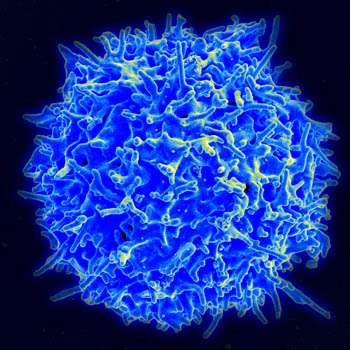Scientists 'supercharge' cancer-fighting T cells

Yale scientists have identified a way to "supercharge" tumor-attacking T cells, a finding that may not only improve the effectiveness of a promising type of cell-based cancer immunotherapy but also expand the number of cancers it can treat.
Their findings are published March 10 in the journal Cell Metabolism.
The discovery can advance CAR-T cell therapy, which harnesses the immune response of T cells to cancers by introducing tumor-detecting molecules into the cells. In the last decade, the U.S. Food and Drug Administration has approved six CAR-T cell therapies to treat B cell lymphomas and multiple myeloma. But despite early successes, the effectiveness of the treatment tends to diminish over time, which has launched a search for ways to boost function of T cells.
Also, there are currently no approved CAR-T cell therapies to treat solid tumors.
For the new study, researchers in the lab of Sidi Chen, associate professor of genetics at Yale and senior author of the paper, devised an ingenious way to efficiently scan the genome of CD8 T cells for specific genes that might enhance the cells' ability to attack cancer cells.
"We developed a new kind of genome-wide gain of function screen to find a molecular enzyme that acts like a foot on a gas pedal to increase metabolic activity in T cells," Chen said.
They found high levels of activity in several genes, including PRODH2, a gene involved in cell metabolism, stimulate increased CAR-T cell activity in mouse models used to study three different types of cancers, including solid-tumor breast cancer. The findings show it is possible to produce hyper-metabolic CAR-T cells that outperform existing cell therapies, researchers say.
Using these systems and findings, future studies can test the newly identified types of metabolically enhanced CAR-Ts in clinical settings, to identify other T cell super-chargers, and to extend cell-based immunotherapy to different cancer types, especially solid tumors, Chen said.
Chen is affiliated with the Yale Cancer Center, the Yale Stem Cell Center, the Yale Center for Biomedical Data Science, and the Systems Biology Institute and Center for Cancer Systems Biology at Yale's West Campus.
Yale's Lupeng Ye, Jonathan Park, Lei Peng, and Quanjun Yang are co-first authors of the paper.
More information: Lupeng Ye et al, A genome-scale gain-of-function CRISPR screen in CD8 T cells identifies proline metabolism as a means to enhance CAR-T therapy, Cell Metabolism (2022). DOI: 10.1016/j.cmet.2022.02.009




















